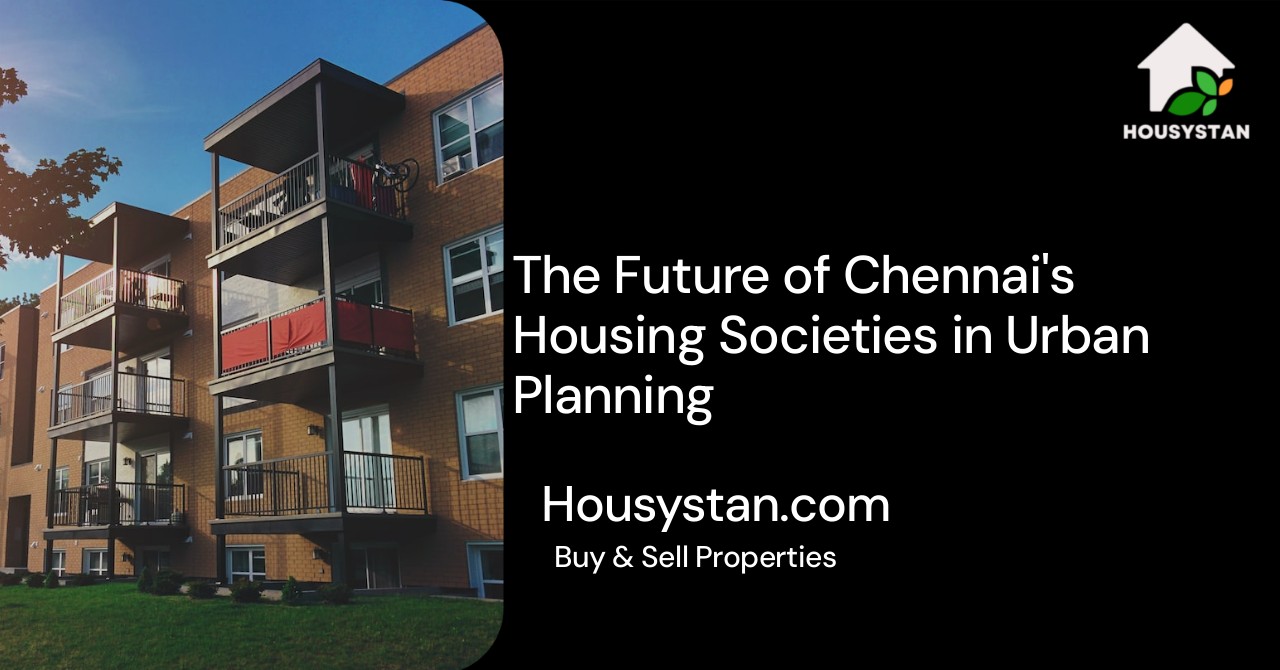The Future of Chennai's Housing Societies in Urban Planning
Read latest blogs and articles from Housystan

The Information mentioned here was last updated on:
29/1/2026The Future of Chennai's Housing Societies in Urban Planning
Chennai, the vibrant capital of Tamil Nadu, is experiencing rapid urbanization. This growth brings exciting opportunities for development and challenges that must be managed carefully. As the city expands, urban planners and developers are keen to optimize housing solutions to accommodate the increasing population. Housing societies are crucial in shaping the urban landscape, providing organized living environments that emphasize community and sustainability. This article explores the future of housing societies in Chennai's urban planning.
The Evolution of Housing Societies in Chennai
- Verified Tenants/Buyers
- Unlimited Property Listing
- Zero subscription/charges fee
A Brief Historical Perspective
Traditionally, housing in Chennai comprised independent homes and small apartment complexes. The concept of housing societies gained momentum in the latter half of the 20th century, reflecting a shift toward community-focused living arrangements. This model offers a blend of privacy, security, and shared amenities, catering to the evolving needs of urban dwellers.
Modern-Day Housing Societies
Today, Chennai's housing societies are more sophisticated, incorporating modern amenities such as swimming pools, gyms, and community halls. These communities foster social interaction and a sense of belonging among residents, a significant factor in their growing popularity. Urban planners envisage these societies as solutions to land scarcity, traffic congestion, and the need for sustainable living environments.
The Role of Urban Planning in Chennai's Housing Development
Identifying Key Challenges
Urban planning in Chennai must address several challenges, including limited land availability, infrastructure development, and environmental sustainability. The city's rapid growth has put pressure on existing systems, necessitating innovative approaches to housing development. Planners aim to balance economic growth, environmental health, and social equity, ensuring a high quality of life for all residents.
Strategic Development and Zoning
To counteract the urban sprawl, strategic zoning and land-use policies are essential. By designating specific areas for residential development, planners can optimize the use of available land and resources. This approach promotes the creation of integrated communities with nearby access to work, education, and recreation, minimizing transportation needs and reducing traffic congestion.
Embracing Sustainable Practices
Green and Smart Housing Solutions
Sustainability is at the forefront of Chennai's urban planning. Housing societies are adopting eco-friendly practices by incorporating green technology and smart design. Solar panels, rainwater harvesting systems, and energy-efficient appliances are becoming standard features in new developments. These initiatives not only reduce environmental impact but can also lower living costs for residents.
Vertical Expansion and High-Rise Living
Given the constraints of limited land, vertical expansion presents a viable solution. High-rise buildings are increasingly seen as a means to accommodate more people within a smaller footprint. These structures, when designed with adequate green spaces and amenities, offer residents the benefits of a well-rounded, urban lifestyle without the drawbacks of overcrowding or excessive pollution.
Technology's Impact on Future Housing Societies
Smart Homes and Digital Connectivity
The integration of technology is transforming housing societies into connected communities. Smart home technologies enhance convenience and security, allowing residents to manage various home functions through their smartphones or other devices. High-speed internet and comprehensive digital infrastructure ensure seamless connectivity, making remote work and digital interactions more feasible.
Data-Driven Urban Planning
Advancements in data analytics provide urban planners with powerful tools to forecast needs and design efficient housing solutions. By analyzing trends and patterns, planners can make informed decisions that lead to optimized layouts, improved public services, and better allocation of resources. This data-driven approach is crucial for developing resilient communities that can adapt to the changing needs of their inhabitants.
Community-Centric Development
Fostering Social Interaction
The design of housing societies in Chennai is increasingly focused on fostering community spirit. Shared spaces like parks, clubhouses, and multipurpose halls encourage social interaction and collective activities. Community-centric development builds strong neighborhood networks, enhancing social cohesion and improving the overall quality of life.
Inclusivity and Affordable Housing
As the demand for housing rises, inclusivity and affordability become critical considerations. Planners and developers are tasked with creating diverse housing options that cater to different socio-economic groups. Affordable housing projects, often supported by government incentives, aim to provide quality living spaces for lower-income families, ensuring equitable access to urban benefits.
Future-Proofing Chennai's Urban Landscape
Resilient Infrastructure and Design
Emphasis on resilient infrastructure is vital in preparing Chennai for future challenges. Constructing buildings that withstand extreme weather, seismic activity, and other environmental changes ensures residents' safety and security. Urban designs that incorporate resilience principles contribute to a stable and sustainable urban environment.
Integration with Public Transit
Efficient public transit systems are integral to sustainable urban living. Housing societies situated near metro lines and bus routes reduce reliance on private vehicles, alleviating traffic congestion and lowering emissions. Planners and developers increasingly prioritize transit-oriented development, ensuring accessibility and convenience for residents.
The Changing Dynamics of Urbanization
Adapting to Changing Population Needs
Chennai's housing societies must remain adaptable to demographic shifts and evolving lifestyle preferences. As the population diversifies, housing solutions need to address the varied demands of families, professionals, and retirees. Flexible design and planning ensure that communities can evolve alongside their inhabitants, remaining relevant and desirable.
Balancing Tradition and Modernity
While innovation drives progress, Chennai's urban planners are also mindful of preserving cultural and historical aspects of the city's identity. By integrating traditional architectural elements with modern design, housing societies can create spaces that honor Chennai's rich heritage while catering to contemporary living standards.
Chennai's journey towards a forward-looking urban environment hinges on the strategic development of its housing societies. By prioritizing sustainability, technology, and community engagement, the city can lay the groundwork for a vibrant, inclusive, and resilient future. Housing societies, as microcosms of urban life, are set to play a pivotal role in shaping the fabric of Chennai's evolving landscape. Through thoughtful planning and innovative approaches, the city is poised to meet the demands of tomorrow's urban dwellers, ensuring a thriving metropolis for generations to come.